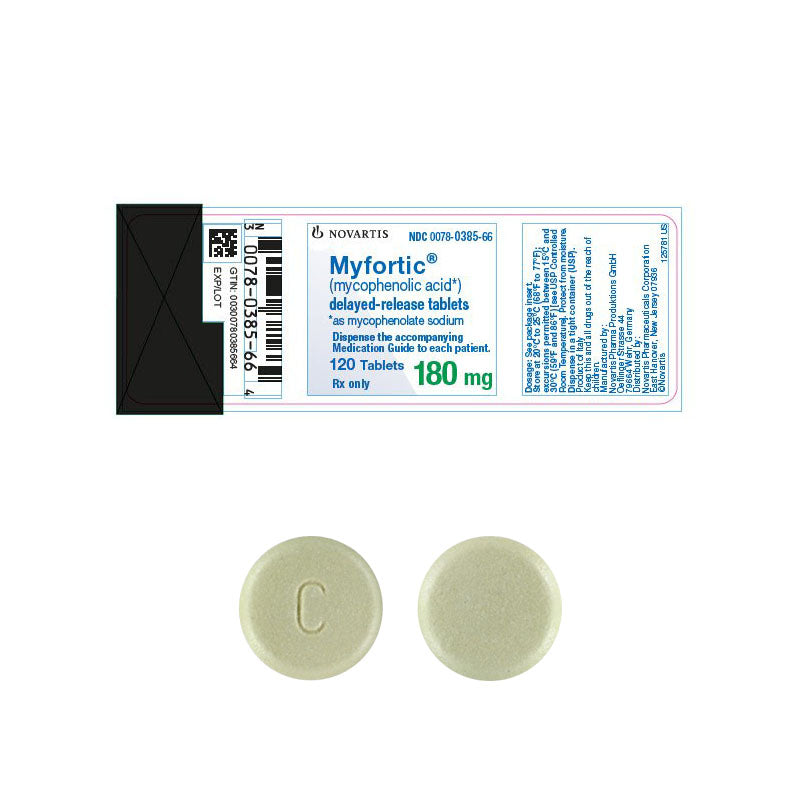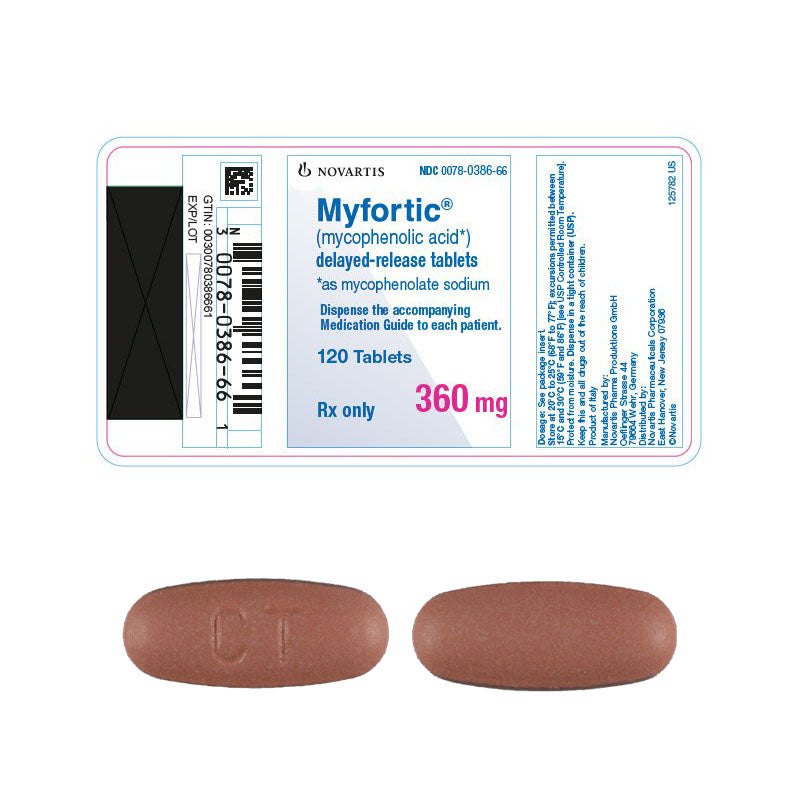NOVARTIS
MYFORTIC (Mycophenolic Acid)
MYFORTIC (Mycophenolic Acid)

Couldn't load pickup availability
What is this medication?
Myfortic is an immunosuppressant that weakens your body's immune system. Your body may "reject" an organ transplant when the immune system treats the new organ as an invader and attacks it. An immunosuppressant helps to prevent this rejection.
Myfortic is used with other medicines to prevent organ rejection after a kidney transplant.
Myfortic is usually given with cyclosporine and a corticosteroid medicine.
Myfortic is for use in adults and children at least 5 years old.
How should I use this medication?
Take Myfortic exactly as prescribed by your doctor. Follow all directions on your prescription label and read all medication guides or instruction sheets.
Take this medicine on an empty stomach, at least 1 hour before or 2 hours after a meal.
Swallow the tablet whole and do not crush, chew, or break it.
Mycophenolic acid (Myfortic) and mycophenolate mofetil (CellCept) are not absorbed equally in the body. Avoid medication errors by using only the brand, form, and strength of this medicine that your doctor has prescribed.
You will need frequent medical tests.
Dosing information:
Usual Adult Dose of Myfortic for Organ Transplant - Rejection Prophylaxis:
- 720 mg orally 2 times daily
Comments:
- This drug should be used in combination with cyclosporine and corticosteroids.
- Take on an empty stomach 1 hour before or 2 hours after food.
- Swallow tablets whole; do not crush, chew, or divide.
Use: For prophylaxis of organ rejection in kidney transplant
Usual Pediatric Dose of Myfortic for Organ Transplant - Rejection Prophylaxis:
5 years and older:
- In conversion (at least 6 months posttransplant): 400 mg/m2 orally 2 times a day (up to a maximum dose of 720 mg 2 times a day)
Note: Pediatric patients with a BSA of 1.19 to 1.58 m2 may be dosed either with three of the 180 mg tablets, or one 180 mg tablet plus one 360 mg tablet 2 times a day. Patients with a BSA greater than 1.58 m2 may be dosed either with four of the 180 mg tablets, or two of the 360 mg tablets twice daily. Pediatric doses for patients with BSA less than 1.19 m2 cannot be accurately administered using currently available formulations of this drug.
Comments:
- This drug should be used in combination with cyclosporine and corticosteroids.
- Take on an empty stomach 1 hour before or 2 hours after food.
- Swallow tablets whole; do not crush, chew, or divide.
Use: For the prophylaxis of organ rejection in pediatric patients 5 years of age and older who are at least 6 months post kidney transplant
What if I miss a dose?
Take the medicine as soon as you can, but skip the missed dose if it is almost time for your next dose. Do not take two doses at one time.
How should I store this medication?
Store at room temperature away from moisture and heat. Keep the bottle tightly closed when not in use.
What should I avoid while taking Myfortic?
Avoid taking an antacid together with Myfortic.
Mycophenolic acid can make you sunburn more easily. Avoid sunlight or tanning beds. Wear protective clothing and use sunscreen (SPF 30 or higher) when you are outdoors.
Do not receive a "live" vaccine while using Myfortic. The vaccine may not work as well during this time, and may not fully protect you from disease. Live vaccines include measles, mumps, rubella (MMR), polio, rotavirus, typhoid, yellow fever, varicella (chickenpox), and zoster (shingles).
Avoid being near people who are sick or have infections. Tell your doctor at once if you develop signs of infection.
You must not donate blood or sperm while using this medicine, and for at least 6 weeks (for blood) or 90 days (for sperm) after your last dose.
What are the possible side effects of using this medication?
Get emergency medical help if you have signs of an allergic reaction to Myfortic: hives; difficult breathing; swelling of your face, lips, tongue, or throat.
Myfortic may cause a serious brain infection that can lead to disability or death. Call your doctor right away if you have problems with speech, thought, vision, or muscle movement. These symptoms may start gradually and get worse quickly.
Mycophenolic acid affects your immune system and may increase your risk of cancer or serious infection. Call your doctor right away if you have:
- fever of 100.5 degrees F or higher, swollen glands, painful mouth sores, cold or flu symptoms, headache, ear pain;
- stomach pain, vomiting, diarrhea, weight loss;
- weakness on one side of your body, loss of muscle control;
- confusion, thinking problems, loss of interest in things that normally interest you;
- pain or burning when you urinate;
- dark urine, jaundice (yellowing of the skin or eyes);
- pain or tenderness around the transplanted kidney;
- tingly or painful blistering rash on one side of your body;
- swelling, warmth, redness, or oozing around a skin wound; or
- a new skin lesion, or a mole that has changed in size or color.
Also call your doctor at once if you have:
- bloody or tarry stools,
- coughing up blood or vomit that looks like coffee grounds; or
- low blood cell counts
- fever, chills, tiredness, flu-like symptoms,
- mouth sores,
- skin sores, easy bruising, unusual bleeding, pale skin,
- cold hands and feet,
- feeling light-headed or short of breath.
Common Myfortic side effects may include:
- upset stomach, nausea, vomiting;
- diarrhea, constipation;
- low blood cell counts, infections;
- sleep problems (insomnia);
- painful urination; or
- pain after surgery.
This is not a complete list of side effects and others may occur. Call your doctor for medical advice about side effects. You may report side effects to FDA at 1-800-FDA-1088.
What other drugs will affect Myfortic?
Tell your doctor about all your other medicines, especially:
- azathioprine;
- cholestyramine; or
- antiviral medicine - acyclovir, ganciclovir.
This list is not complete. Other drugs may interact with mycophenolic acid, including prescription and over-the-counter medicines, vitamins, and herbal products. Not all possible drug interactions are listed here.




